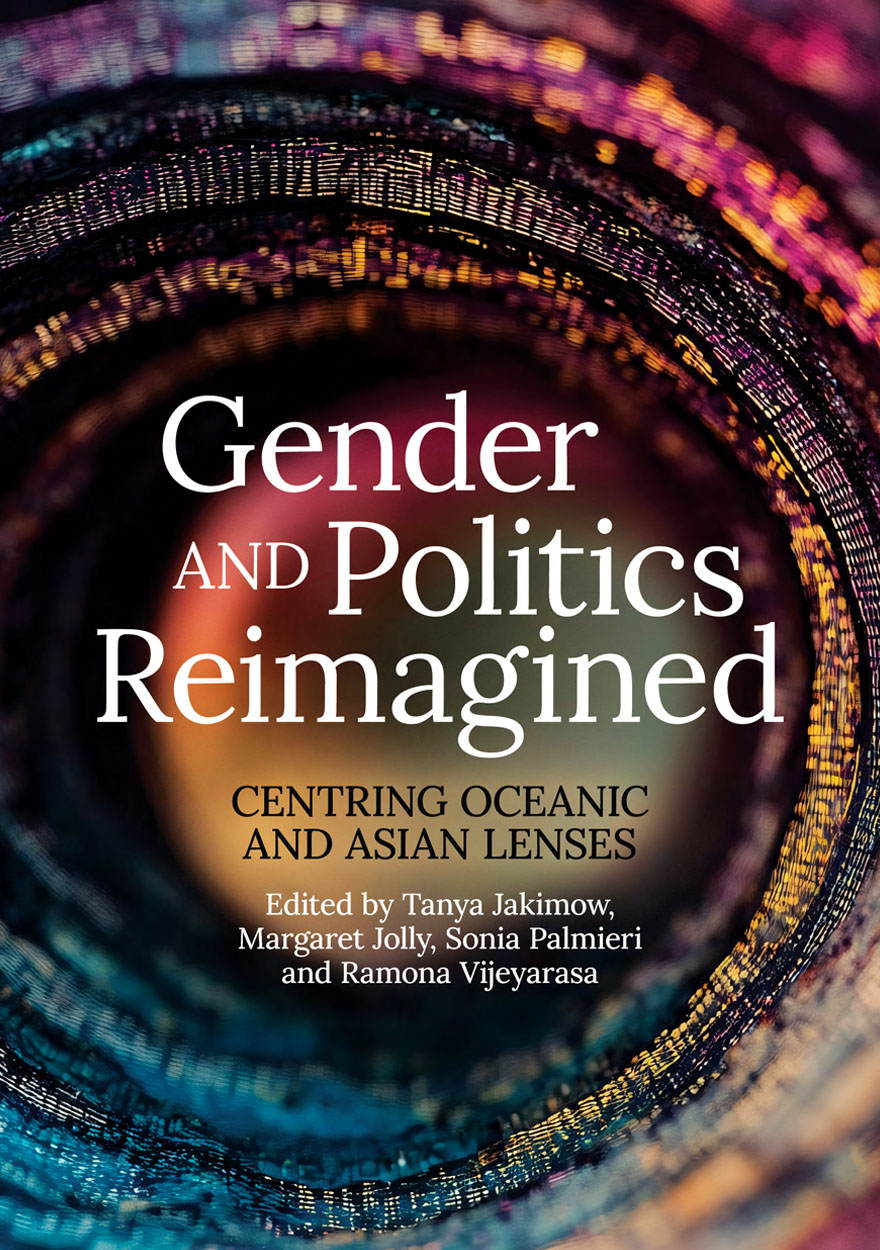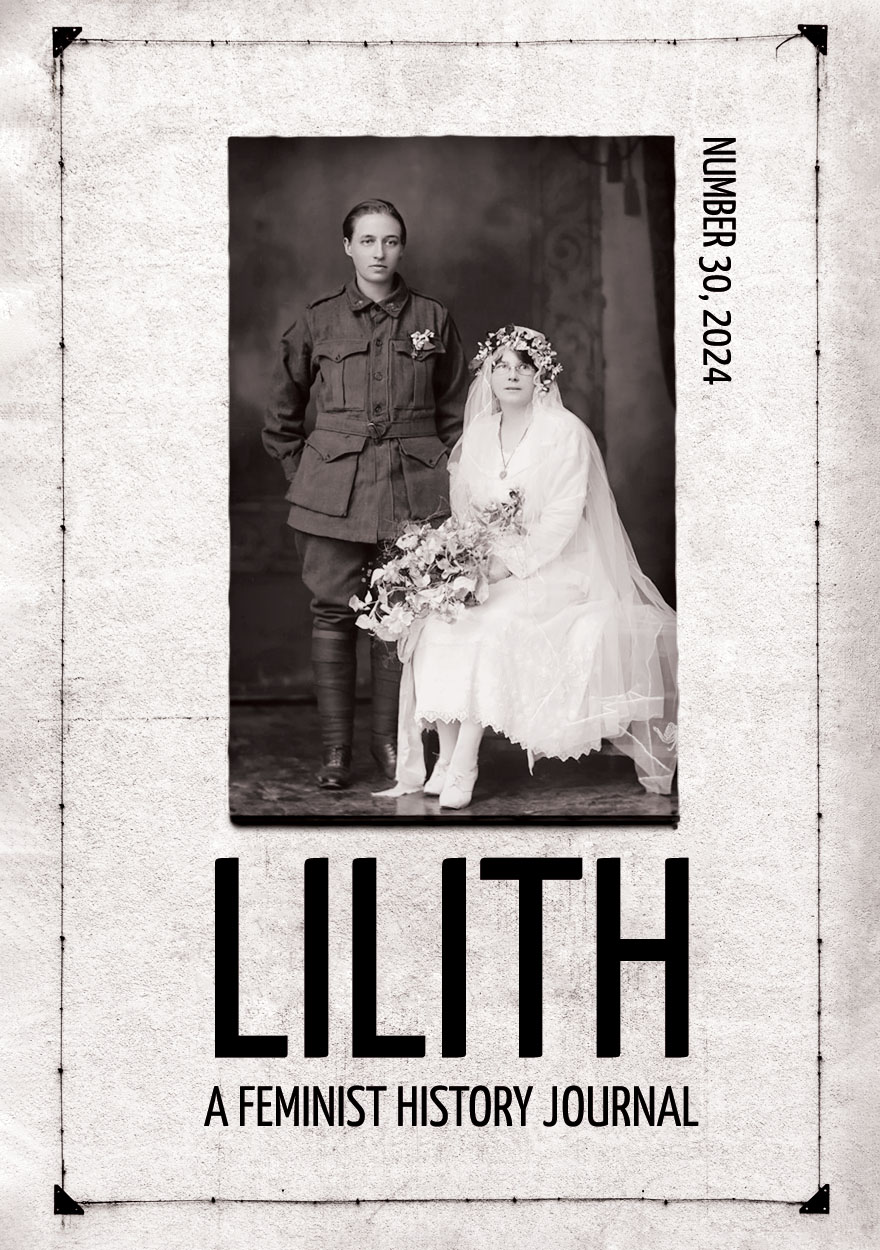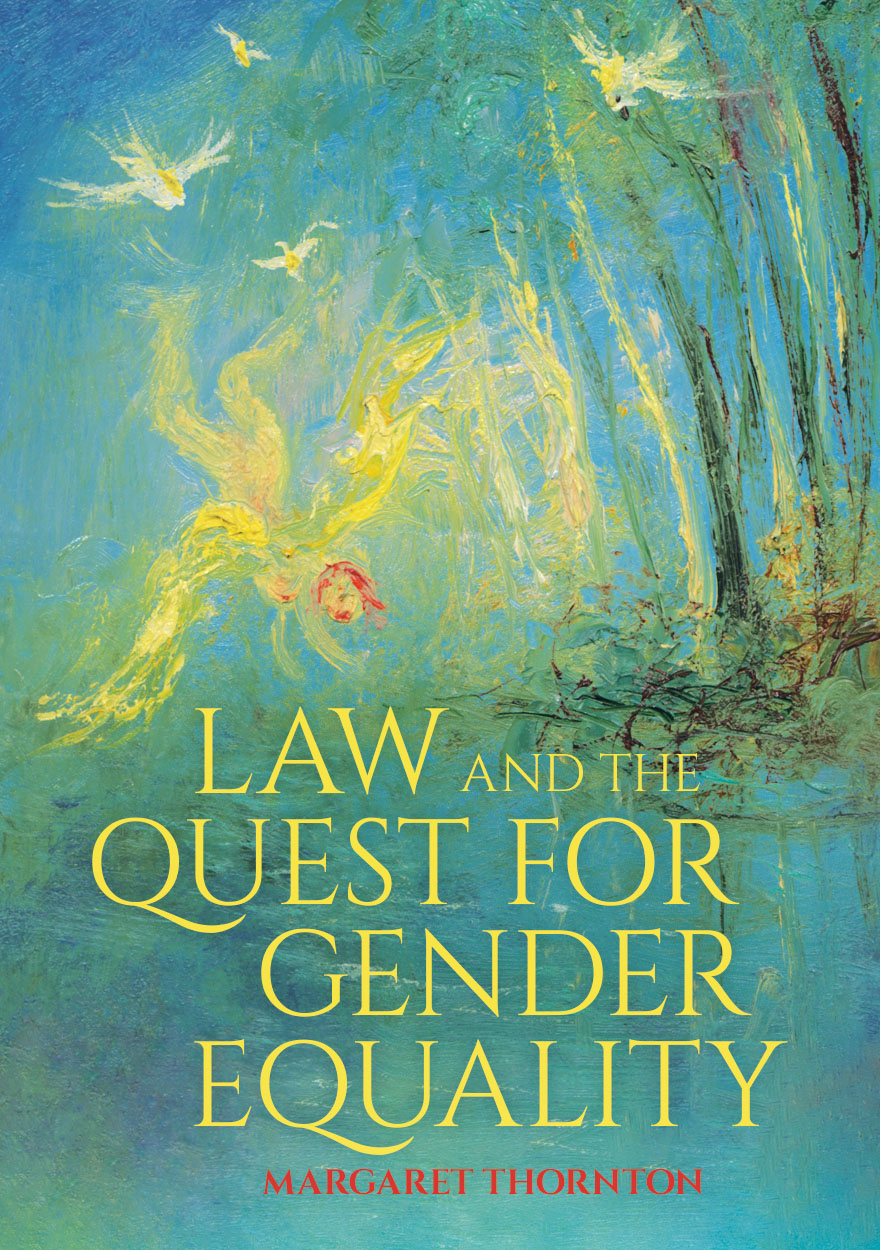Search titles
Displaying results 1 to 10 of 55.

Gender and Politics Reimagined »
Centring Oceanic and Asian Lenses
Publication date: 2025
This timely collection reflects a coming together of academics, gender and development practitioners and activists to reflect on the gendering of politics. By centring Asia and Oceania and traversing numerous disciplines, the volume disrupts the illusion of certainty and clarity as to what is known about gender and politics. Individual chapters present specific research projects, while providing epistemological, theoretical and methodological reflections on how knowledge is produced and by whom, challenging the existing canon. The contributions collectively demonstrate the possibilities for theorising from Asia and Oceania to address the lack of diversity in political representation and leadership on a global scale, in which gender, race, class, caste, (dis)ability and sexual identity are powerfully interconnected.
Arising out of the Gender and Cultural Diversity in Politics: Australia, Asia and the Pacific workshop held at The Australian National University in 2022, this collection underscores the importance of fostering scholarship and mentorship in the academy. The diversity of authorship encompasses differences in ethnicity, nationality, sexuality and career stage, with an emphasis on the inclusion of authors from various Oceanic and Asian countries. The volume promotes academic practice as integral to social change, and social action as a form of knowledge production. As such, Gender and Politics Reimagined is sure to be a cornerstone in future scholarly and activist discussions.
Coming soon
Notify me
Lilith: A Feminist History Journal: Number 30 »
Publication date: March 2025
The 2024 issue of Lilith benefited from some unusual contributions from international scholars from South Africa, Finland, the US and the UK, and from Australian-based researchers at the University of NSW, The Australian National University, Western Sydney University, the University of Melbourne, the University of New England, James Cook University, the Australian Catholic University, Charles Darwin University and the University of Wollongong. Many of these researchers participated in our 2023 Lilith Symposium at ACU Melbourne on ‘Gender & Joy’ in feminist history, which benefitted from inspirational keynote addresses by Professor Katie Barclay (Macquarie University) and Dr Yves Rees (La Trobe University). This issue contains articles on historical themes as diverse as African pottery, theology, poetry and Black women’s joy, Paris trans identity and cabaret theatre, First World Wartime cross-dressing, British Enlightenment women’s writing, early twentieth-century domestic servants in South Australia, and working girls’ clubs in Chicago. Our eight book reviewers evaluated works on visual cultures of pregnancy, Japanese biopolitics of reproduction, international women peace advocates, women in the Whitlam government, the wife of George Orwell, the global history of courtship, and both Pakistani and Australian histories of motherhood.
As in other issues of Lilith in recent years, 2024 saw a balance of local Australian histories which uncovered new aspects of gendered concepts and identities of the past, along with comparative intercultural inquiries, highlighting the importance of internationalisation in movements beginning on one context but later influencing several others. This volume also showcases the engagement in history of scholars from other disciplines who share our desire to honour and celebrate the joy, laughter, struggle, resilience and survival of women and gender-diverse people of different races and cultures, past and present, across the world.
Download for free
Not available for purchase

Lilith: A Feminist History Journal: Number 29 »
Publication date: December 2023
The 2023 issue of Lilith showcases the journal’s dedication to encouraging underrepresented voices in historical writing, including early-career scholars, First Nations voices and historians from diverse linguistic and cultural backgrounds. Six of the research articles in the issue focus on nineteenth and early twentieth-century topics, with papers on women’s roles in interwar international diplomacy, on Indian prostitution under British colonialism, on the relationship between interracial rape and white femininity on the Australian colonial frontier, on the role of gender in the NSW Shipwreck Society of the late nineteenth century, and on the struggle of women for public lavatories in 1912 Meanjin (Brisbane). Two of the research articles concern more recent histories, with papers on the role of Māori women in feminist movements of the 1970s, and the construction of sexual consent in Dolly Magazine of the late twentieth century. There is also a review essay about global histories of feminism and gender struggle which evaluates several recent such works, reflecting on their methodological innovations and concerns. The edition includes six short book reviews that span a wide range of international and local interests, covering topics such as the digital humanities, the global history of sexual violence, US queer history, Australian queer women’s history, gender in European colonial travel, and the history of the pram in Australia.
Several of the articles in the volume concern the international engagement of feminist struggles and intercultural questions in relation to gendered roles in history, while others gesture beyond the concerns of historical studies alone, addressing issues of rape culture, political activism, women’s spaces, and gendered emotions, making valuable contributions to the wider Australian humanities and social sciences. The volume exemplifies the value of balancing international trends in feminist history with the recognition of local episodes in the history of gender struggle, underscoring Lilith's commitment to advancing new forms of feminist historical writing and showcasing innovative research by scholars at diverse career stages.
Download for free
Not available for purchase

Sisters in Peace »
The Women’s International League for Peace and Freedom in Australia, 1915–2015
Authored by: Kate Laing
Publication date: November 2023
Is preparing for war the best means of preserving peace? In Sisters in Peace, Kate Laing contends that this question has never been solely the concern of politicians and strategists. She maps successive generations of twentieth-century women who were eager to engage in political debate even though legislative and cultural barriers worked to exclude their voices.
In 1915, during the First World War, the Women’s International Congress at The Hague was convened after alarmed and bereaved women from both sides of the conflict insisted that their opinions on war and the pathway to peace be heard. From this gathering emerged the Women’s International League for Peace and Freedom (WILPF), which to this day campaigns against militarism and nuclear weapons. In Australia, the formation of a section of WILPF connected political women to a worldwide network that sustained their anti-war activism throughout the last century.
In examining the rise of WILPF in Australia, Sisters in Peace provides a gendered history of this country’s engagement with the politics of internationalism. This is a history of WILPF women who committed to peace activism even as Australia’s national identity and military allegiances shifted over time—a history that has until now been an overlooked part of the Australian peace movement.

Law and the Quest for Gender Equality »
Authored by: Margaret Thornton
Publication date: April 2023
For centuries, law was used to subordinate women and exclude them from the public sphere, so it cannot be expected to become a source of equality instantaneously or without resistance from benchmark men—that is, those who are white, heterosexual, able-bodied and middle class. Equality, furthermore, was attainable only in the public sphere, whereas the private sphere was marked as a site of inequality; a wife, children and servants could never be the equals of the master. Despite their ambivalence about the role of law and its contradictions, women and Others felt that they had no alternative but to look to it as a means of liberation.
This skewed patriarchal heritage, the subtext of this collection of essays, has continued to impede the quest for equality by women and Others. It informs not only gender relations in the private sphere, as illustrated by domestic violence and sexual assault, but also the status of women in the public sphere. Despite the fact that women have entered the paid workforce—including the professions—in large numbers, they are still expected to assume responsibility for the preponderance of society’s caring. The essays show how maternal and caring roles, which are still largely viewed as belonging to an unregulated private sphere, continue to be invoked to detract from the authority of the feminine in the public sphere. The promise of antidiscrimination legislation in overcoming the heritage of the past is also shown to be somewhat hollow.

Lilith: A Feminist History Journal: Number 28 »
Publication date: December 2022
New research in this issue of Lilith includes studies of feminist vegetarian activism in Victorian England; the lives of Japanese businesswomen in North Queensland before 1941; negotiations of gender amongst women combatants in Tigray, Ethiopia; and the impacts of the Covid-19 pandemic on women. Each of the four research articles draws upon new sources and interpretations that shed light on the varied experiences of women within and beyond Australia, often challenging established norms or assumptions about progress.
In ‘Vegetarians, Vivisection and Violationism’, Ruby Ekkel explores the centrality of vegetarianism to the activities and lived experience of noted Victorian activist Anna Kingsford. Tianna Killoran’s article ‘Sex, soap and silk’ draws on newly accessible sources in moving beyond traditional narratives that characterise Japanese women in interwar North Queensland as impoverished sex workers. In ‘A Soldier and a Woman’, Francesca Baldwin examines how women combatants in Tigray, Ethiopia, negotiated the connections and collisions between soldiering and womanhood during and after the 1974–91 civil war. Petra Brown and Tamara Kayali Browne’s article ‘Relational Autonomy: Addressing the Vulnerabilities of Women in a Global Pandemic’ explores how the individualistic/atomistic model of autonomy in responses to Covid-19 has disproportionately disadvantaged women.
This issue also contains nine short essay responses from experienced gender scholars—including Ann Curthoys, Sharon Crozier-De Rosa, Catherine Kevin, Ann McGrath, Janet Ramsey, Yves Rees, Madeleine C. Seys, Jordana Silverstein, and Zora Simic—to the question ‘What does it mean to do feminism in 2022?’ These essays reveal the political power of feminist history-making, since, as Ann Curthoys argues in her essay, feminist history is itself a form of activism.
Taken together, these research articles and essays, along with the editorial, demonstrate the fallibility of the notion of history being a narrative of linear progress without relevance to our current reality. They urge against political complacency about the Covid-19 pandemic, colonialism or women's oppression as existing only in the past.
Download for free
Not available for purchase

Wives and Wanderers in a New Guinea Highlands Society »
Women’s lives in the Wahgi Valley
Authored by: Marie Olive Reay
Publication date: January 2022
Wives and Wanderers in a New Guinea Highlands Society brings to the reader anthropologist Marie Reay’s field research from the 1950s and 1960s on women’s lives in the Wahgi Valley, Central Highlands of Papua New Guinea. Dramatically written, each chapter adds to the main story that Reay wanted to tell, contrasting young girls’ freedom to court and choose partners, with the constraints (and violence) they were to experience as married women.
This volume provides readable ethnographic material for undergraduate courses, in whole or in part. It will be of interest to students and scholars of gender relations, anthropology and feminism, Melanesia and the Pacific. The material in this book, which Reay had written by 1965 but never published, remains startlingly contemporary and relevant.
Marie Olive Reay was a social anthropologist who did research in Australian Indigenous communities and in the Wahgi Valley in the Central Highlands of Papua New Guinea. Employed at The Australian National University from 1959 to 1988 when she retired, Reay passed away in 2004. In 2011 this manuscript was found in her personal papers, reconstructed and edited by Francesca Merlan, augmented here by an additional introduction by eminent anthropologist of the Highlands, and of gender, Marilyn Strathern.
Had this manuscript appeared when Reay apparently completed it in its present form – around 1965 – it would have been the first published ethnography of women’s lives in the Central Highlands of Papua New Guinea. Its retrieval from Reay’s papers, and availability now, adds a new dimension to works on gender relations in Melanesian societies, and to the history of Australian and Pacific anthropology.

Lilith: A Feminist History Journal: Number 27 »
Publication date: December 2021
This year’s issue covers a rich variety of topics in feminist history, including: the role of place and space in feminist and lesbian identity-making in 1970s’ Melbourne; a decolonising approach to writing the history of women and children in Alice Springs; the importance of recipe exchange in kinship networks in seventeenth-century Ireland; an examination of the life of twentieth-century poet’s muse Katie Anna Lush; the political theatre employed by the Australian Women’s Movement Against Socialism in the 1940s; the targeting of wine advertisements at Australian women in the 1950s and 1960s; and an exploration of the processes of power within natural history societies in nineteenth-century South Australia. There are also two articles that form a special section on the topic of the female frame, one on the role of uniforms for women workers in the transport industry, and the other comparing archetypes of the infanticidal mother in fin-de-siècle Australian and France.
Download for free
Not available for purchase

Made in China Journal: Volume 6, Issue 2, 2021 »
Edited by: Ivan Franceschini, Nicholas Loubere
Publication date: December 2021
Since its announcement in 2013, the Belt and Road Initiative (BRI) has become the main lens through which both observers and stakeholders trace China’s global footprint. Whether cheered on as a new engine of economic development in a fraught and increasingly unequal world or frowned on as a masterplan through which the Chinese authorities are attempting to establish global hegemony, the infrastructure component of the BRI has become such an important frame in discussions of Global China that less tangible aspects that are not in its purview tend to be lost or overlooked. One of these neglected dimensions is China’s long history of international engagement aimed at building economic, political, social, and cultural ties in both the Global North and the Global South. Frequently, we tend to forget how the international presence of Chinese actors we are currently observing did not just happen overnight, but was built on decades of experience of China’s interaction with the rest of the world. In the belief that examining these historical precedents can help us shed light on both the continuities and the discontinuities in the practices of today and that only by digging into the dirt of history can we excavate the roots of the dynamics we are witnessing, this issue is dedicated to the ‘archaeologies of the BRI’.
Download for free
Not available for purchase

Sound Citizens »
Australian Women Broadcasters Claim their Voice, 1923–1956
Authored by: Catherine Fisher
Publication date: June 2021
In 1954 Dame Enid Lyons, the first woman elected to the Australian House of Representatives, argued that radio had ‘created a bigger revolution in the life of a woman than anything that has happened any time’ as it brought the public sphere into the home and women into the public sphere. Taking this claim as its starting point, Sound Citizens examines how a cohort of professional women broadcasters, activists and politicians used radio to contribute to the public sphere and improve women’s status in Australia from the introduction of radio in 1923 until the introduction of television in 1956. This book reveals a much broader and more complex history of women’s contributions to Australian broadcasting than has been previously acknowledged.
Using a rich archive of radio magazines, station archives, scripts, personal papers and surviving recordings, Sound Citizens traces how women broadcasters used radio as a tool for their advocacy; radio’s significance to the history of women’s advancement; and how broadcasting was used in the development of women’s citizenship in Australia. It argues that women broadcasters saw radio as a medium that had the potential to transform women’s lives and status in society, and that they worked to both claim their own voices in the public sphere and to encourage other women to become active citizens. Radio provided a platform for women to contribute to public discourse and normalised the presence of women’s voices in the public sphere, both literally and figuratively.



